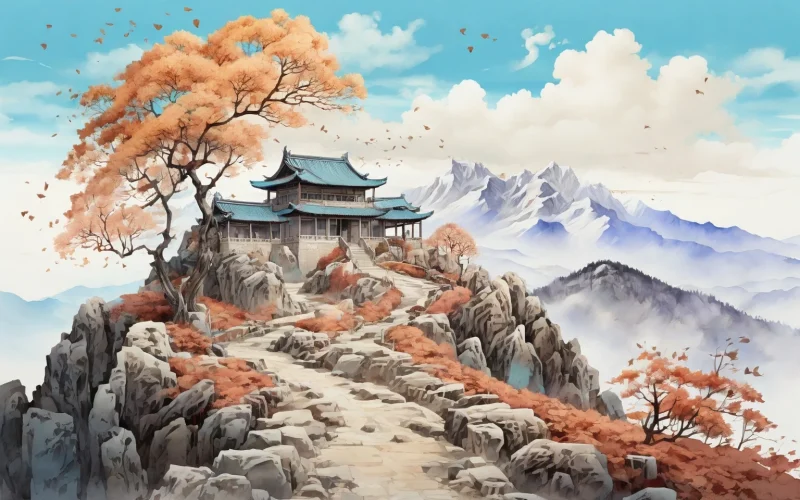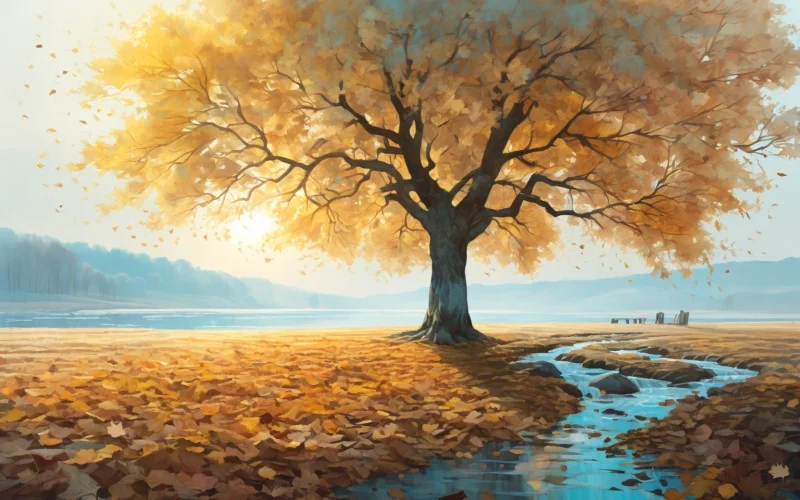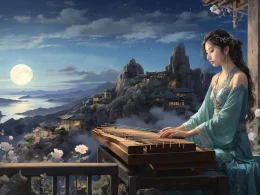The sun and moon will not slow doom;
Four seasons press each other on.
The chilly wind strips trees away;
Fallen leaves strewn along the way.
My health turns weak with worsened fate;
My black hair has whitened of late.
Of age my head bears the pale sign,
My forward way on the decline.
My home becomes an inn for rest;
The dweller's rather like a guest.
Oh, where, oh, where can I still go?
To the graveyard 'neath southern hill.
Original Poem
「杂诗 · 其七」
陶渊明
日月不肯迟,四时相催迫。
寒风拂枯条,落叶掩长陌。
弱质与运颓,玄鬓早已白。
素标插人头,前途渐就窄。
家为逆旅舍,我如当去客。
去去欲何之?南山有旧宅。
Interpretation
Miscellaneous Poems VII was composed around 414 AD during Tao Yuanming's later years. Having retreated to rural life and approaching old age, he no longer resisted life's transitions or the laws of mortality, instead accepting them with transcendent serenity. Through seasonal changes and impending aging, this poem employs the metaphor of life as a journey ("sojourner's lodge") culminating in the "old abode" - the family burial ground - revealing a philosopher's detachment beyond worldly concerns, free from joy or fear.
First Couplet: "日月不肯迟,四时相催迫。"
Rì yuè bù kěn chí, sì shí xiāng cuī pò.
Sun and moon never linger,
Four seasons press with urgent finger.
Conveys time's relentless passage, highlighting life's transience with profound urgency.
Second Couplet: "寒风拂枯条,落叶掩长陌。"
Hán fēng fú kū tiáo, luò yè yǎn cháng mò.
Winter winds whip barren boughs,
Fallen leaves cloak field paths now.
Desolate imagery mirrors human aging, suggesting people like leaves must return to roots.
Third Couplet: "弱质与运颓,玄鬓早已白。"
Ruò zhì yǔ yùn tuí, xuán bìn zǎo yǐ bái.
Frail body, declining fate,
Once jet-black hair now turns sere.
Portrays physical and spiritual decline, the vanished vigor of youth evoking desolation.
Fourth Couplet: "素标插人头,前渐就窄。"
Sù biāo chā rén tóu, qián jiàn jiù zhǎi.
White grave-marker awaits,
Life's path narrows at death's gates.
Confronts mortality as inevitable process, blending starkness with philosophical insight.
Fifth Couplet: "家为逆旅舍,我如当去客。"
Jiā wéi nì lǚ shè, wǒ rú dāng qù kè.
Home becomes transient inn,
I the departing guest within.
Incorporates Daoist-Buddhist concepts, comparing life to temporary lodging with enlightened perspective on rebirth.
Sixth Couplet: "去去欲何之?南山有旧宅。"
Qù qù yù hé zhī? Nán shān yǒu jiù zhái.
Where does this departure lead?
Southern Mountain's ancestral stead.
Concludes with destination - "Southern Mountain" symbolizing the grave, where life returns to origins.
Holistic Appreciation
Though austere in tone, the poem contains profound philosophy. The opening couplet establishes time's inexorable flow and life's brevity. Middle couplets transition seamlessly from nature ("barren boughs," "fallen leaves") to human decay ("white hair," "frail body"), simultaneously describing natural scenes and life's decline. Without lamentation, the poet encapsulates life's essence in "home becomes transient inn." The finale's "Southern Mountain's ancestral stead" expresses serene acceptance of death, suggesting both "returning to roots" and merging with nature.
Artistic Merits
The poem features concise language and stark, symbolic imagery. "Sun/moon," "seasons," "winter winds" and "fallen leaves" weave temporal transitions, while "white hair" and "grave-marker" directly address aging and mortality. Its strict structure and parallel couplets contain restrained yet far-reaching emotion. The "transient inn/departing guest" metaphor particularly exemplifies Tao's signature "simple yet profound" style, perfectly conveying cosmological perspectives through minimal words.
Insights
"Miscellaneous Poems VII" reveals crucial life wisdom: humans are but temporary travelers. Facing aging and death, rather than fearful avoidance, we should emulate Tao Yuanming's composure, viewing death as homecoming. In our increasingly accelerated modern existence, this "accepting nature, peaceful return" attitude remains profoundly relevant. The poet's calm yet penetrating voice reminds us: acknowledging life's end constitutes deeper existential wisdom.
Poem translator
Xu Yuanchong (许渊冲)
About the poet

Tao Yuanming(陶渊明), 365 – 427 CE, was a poet, literary figure, fu writer, and essayist active during the late Eastern Jin and early Liu Song dynasties. Born in Chaisang (near present-day Jiujiang, Jiangxi Province), he pioneered a new genre of pastoral-themed literature, expressing profound philosophical insights through simple language. His poetic style became an enduring aesthetic standard in classical Chinese poetry.











